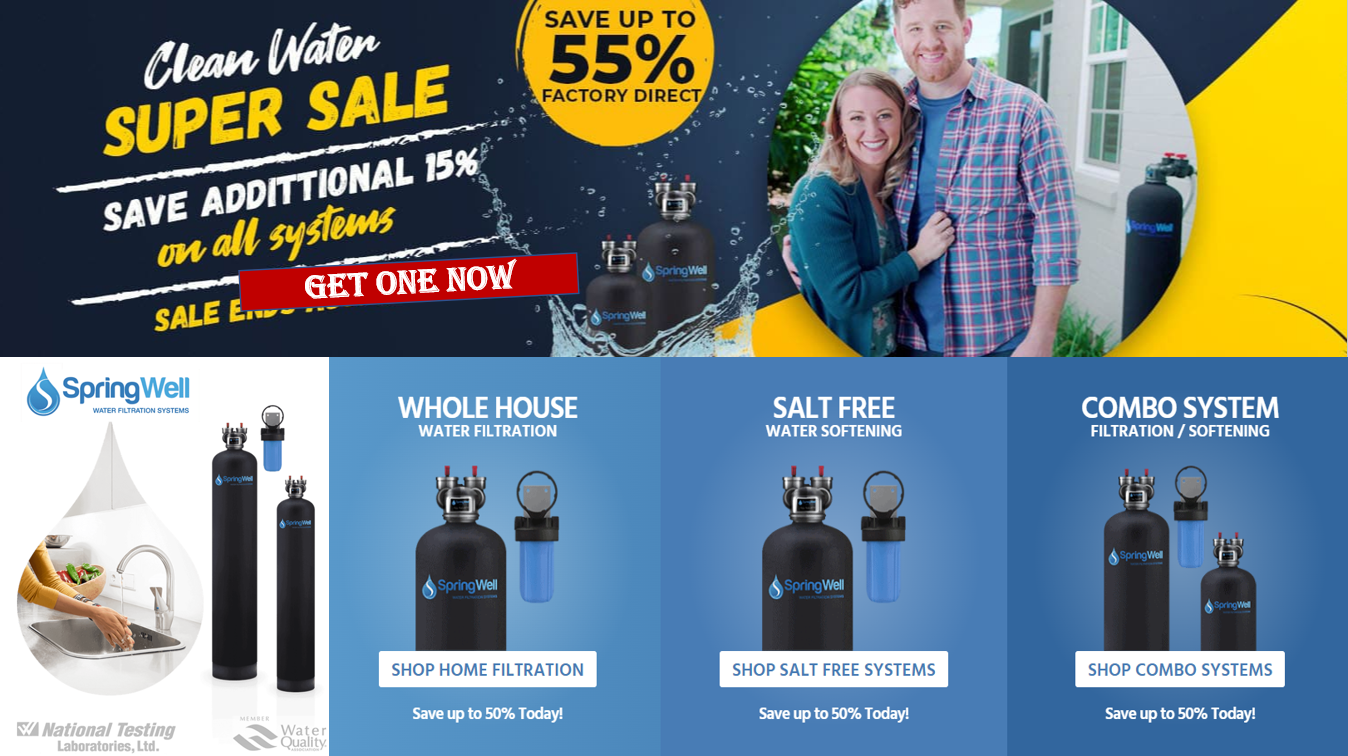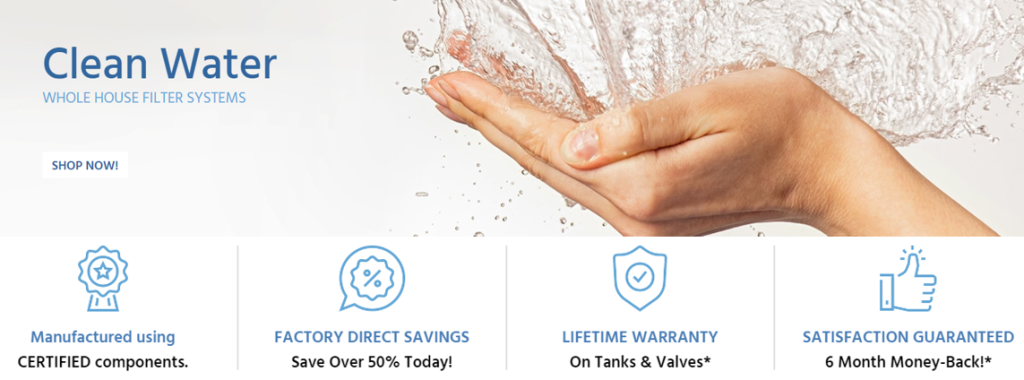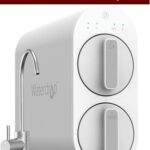A water softener is used to remove hard water minerals from your water supply.
In 2004, the city of Flint, Michigan switched its water source from Lake Huron to the Flint River in an effort to save money. However, the Flint River water was highly corrosive and caused lead to leach from the pipes into the city’s water supply. As a result, the Flint community was exposed to high levels of lead, which can cause serious health problems.
In 2015, a group of concerned citizens, including Flint resident LeeAnne Walters, brought the issue to the attention of the Environmental Protection Agency (EPA). The EPA launched an investigation and found that the city of Flint was not providing safe drinking water to its residents.
The Flint water crisis brought national attention to the issue of water safety and highlighted the importance of water treatment and infrastructure. It also inspired people across the country to take action to improve the safety of their own water supplies.
Install a Home Water Filter & Get "Unlimited Safe Drinking Water" For Decades
Get Upto 55% Discount With a Lifetime Warranty & 6-Months Money Back Guarantee Free Shipping
SpringWell Water Filtration Systems: 100% American-Made & NSF Certified Water Filters and Water Softeners
What Is A Water Softener?
A water softener is a device that is used to remove hardness minerals from water.

A water softener is a device that is used to remove hard minerals from water. Hard water is water that contains high levels of calcium and magnesium. These minerals can cause a number of problems, such as making it difficult to get soap to lather, leaving spots on dishes and clothing, and making it difficult to clean. A water softener works by exchanging the hard minerals in water for sodium ions. This process is known as ion exchange.
There are a number of different types of water softeners on the market. The most common type is the ion exchange water softener. This type of water softener exchanges the hard minerals in water for sodium ions. The sodium ions attach to the resin beads in the water softener. As water flows through the resin beads, the hard minerals are removed from the water.
Another type of water softener is the reverse osmosis water softener. This type of water softener uses a process known as reverse osmosis to remove the hard minerals from water. Reverse osmosis is a process where water is forced through a semipermeable membrane. The hard minerals are too large to pass through the membrane, so they are removed from the water.
If you have hard water, a water softener can be a great way to improve the quality of your water. A water softener will remove the hard minerals from your water, making it easier to get soap to lather, leaving fewer spots on dishes and clothing, and making it easier to clean.
How Does A Water Softener Work?
A water softener works by removing minerals from water that cause hardness.
A water softener is a device that is used to remove magnesium and calcium ions from water. These ions are responsible for the hard water. The device works by exchanging the ions with sodium or potassium ions. This process is known as ion exchange.
The water softener has two chambers. The first chamber contains the ion exchange resin. The second chamber contains the brine solution. The hard water is passed through the first chamber. The magnesium and calcium ions are removed from the water and are replaced with sodium or potassium ions. The second chamber contains the brine solution. This solution is used to regenerate the ion exchange resin.
The water softener is a very useful device. It helps to remove the magnesium and calcium ions from water. This helps to improve the quality of water.
What Are The Benefits Of Using A Water Softener?
Water softeners remove minerals from water that can cause hard water, making it easier to clean and extending the life of appliances.
Water softeners are devices that are installed in homes to remove minerals that make water hard. The hard water leaves behind deposits of calcium and magnesium on fixtures and appliances, which can lead to costly repairs. Additionally, hard water can make it difficult to get clothes clean and cause skin irritation. Water softeners work by exchanging the magnesium and calcium ions in hard water with sodium ions. This process is known as ion exchange.
Water softeners can be beneficial for a number of reasons. One of the main benefits is that they can help to extend the life of your plumbing fixtures and appliances. By removing the hard water deposits, you can prevent costly repairs down the road. Additionally, water softeners can improve the quality of your water, making it easier to get clothes clean and preventing skin irritation. If you have hard water, a water softener may be a good option for you.
How Do You Install A Water Softener?
You install a water softener by connecting it to your home’s water supply.
If your home has hard water, you may have noticed some negative effects. Hard water can cause appliances to break down more quickly and leave spots on dishes and clothing. Perhaps most noticeably, hard water can make your skin and hair feel dry.
One solution to hard water is to install a water softener. Water softeners remove minerals from water, making it easier for soap to do its job. As a result, you can use less soap and save money on laundry and cleaning supplies.
Installing a water softener is a pretty straightforward process. Most units come with clear instructions. But just in case, here is a general overview of how to install a water softener.
1. Choose a location. Water softeners need to be connected to your water supply, so you’ll need to choose a spot near your water heater or other water source. The unit will also need to be near a drain.
2. Turn off the water. Before you do any work on your plumbing, you need to turn off the water. Locate the main water shut-off valve and turn it to the “off” position.
3. Cut the pipes. Once the water is shut off, you’ll need to cut the pipes that connect to your water heater or other water source. You’ll also need to cut a drainpipe. You can use a hacksaw for this.
4. Install the water softener. Follow the instructions that come with your water softener. This will involve connecting the unit to the water supply and drain pipes.
5. Turn on the water. Once the water softener is installed, you can turn the water back on. Start with the main shut-off valve, then turn on the water heater or other water source.
6. Test the water softener. Run water through the faucet near your water softener to see if it’s working properly. If everything looks good, you’re all set!
Installing a water softener is a relatively easy process. But if you’re not comfortable working with plumbing, you may want to hire a professional. Either way, you’ll enjoy the benefits of softer water in no time.
How Do You Maintain A Water Softener?
You need to add salt to a water softener on a regular basis.
If your home has hard water, a water softener can be a lifesaver. Hard water can cause all sorts of problems, from reducing the lifespan of your appliances to making your hair and skin feel dry and irritated.
A water softener works by exchanging the hard minerals in your water (calcium and magnesium) for soft minerals (usually sodium). This process is known as ion exchange.
There are two types of water softeners: salt-based and salt-free. Salt-based water softeners use salt to clean the resin beads that remove the hard minerals from the water. Salt-free water softeners use a process known as chelation to bind the hard minerals so they can be flushed from the system.
Both types of water softeners require maintenance to keep them working properly. Here are some tips on how to maintain your water softener:
1. Check the salt level regularly. If you have a salt-based water softener, you’ll need to add salt to the brine tank on a regular basis. The frequency will depend on the size of your unit and the hardness of your water.
2. Clean the brine tank. Over time, the brine tank can become clogged with sediment. This can reduce the efficiency of your water softener. To clean the brine tank, simply remove the lid and scrub the inside with a brush.
3. Backwash the filter. Most water softeners have a filter that traps sediment and other impurities. This filter should be backwashed on a regular basis to remove the build-up.
4. Test the water. You should test the hardness of your water on a regular basis. This will help you determine if your water softener is working properly.
5. Call a professional. If you’re having trouble with your water softener, it’s best to call a professional. They can diagnose the problem and make the necessary repairs.
FAQ
What Are The Different Types Of Water Softeners?
Ion exchange water softeners work by exchanging the hardness ions in the water with soft ions. This process is repeated until the water is soft.
Reverse osmosis water softeners work by using a semipermeable membrane to remove the hardness ions from the water.
Distillation water softeners work by heating the water to evaporate it, leaving the hardness ions behind.
What Are The Different Sizes Of Water Softeners?
What Is The Cost Of A Water Softener?
How Long Does A Water Softener Last?
Conclusion
There is no one-size-fits-all answer to this question, as the amount of water softener you need depends on a number of factors, including the hardness of your water, the size of your home, and the number of people in your household. However, a general rule of thumb is that you will need about 1 gallon of water softener per person in your household.
I hope this answers your question. If you have any further questions, please don’t hesitate to ask in the comments section below.


